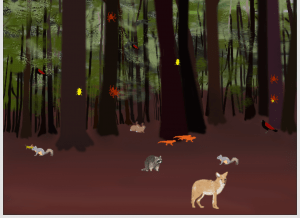Science is pretty amazing and if our current world-wide situation shows us anything, it is how important our understanding of the world around us is. Below is a series of links and simulators to help in comprehending how science really works. Grappling with enormous concepts begins with the comprehension of numerous small things. Hopefully items in this list provide the stepping stones to move from a basic idea to the working reality and proof of a scientific concept.
Physics is so cool. It can explain the motion in the scale as grand as that of the planets and solar system, down to the subatomic level of atoms and electrons. Visualizing either of these things is very difficult. Luckily there are a number of simulators our there that can aid us into understanding how all of this works relatively to each other (get it? Relatively? Relativity? huh? no? humph).
The PhET Interactive Simulations project at the University of Colorado Boulder  offers some really incredible simulations. I was first introduced to their website by a physics teacher and even the simplest simulation around electron motion clarified some of the questions around atomic structure that had been plaguing me for years. While the simulations in physics continue to leave me dumbfounded, there are examples from chemistry, math, earth science and biology as well.
offers some really incredible simulations. I was first introduced to their website by a physics teacher and even the simplest simulation around electron motion clarified some of the questions around atomic structure that had been plaguing me for years. While the simulations in physics continue to leave me dumbfounded, there are examples from chemistry, math, earth science and biology as well.
Positive physics is more formally inspired to teach and learn physics, as they also provide the ability for students and teachers to track progress through grade level targets. Due to school closures, the website is being offered for free through July 2020. Teachers will need to sign-up to join, then create their classes to provide students class codes.
If physics is confounding to me, chemistry is downright frustrating. The idea of things interacting at a molecular level has always been beyond my capabilities to visualize and understand. While the formulas may make sense to me, the reality behind what occurs during a chemical reaction is boggling.
ChemMatters Online is and educational site sponsored by the American Chemical Society. You can find a series of videos and articles that help make the connections as to why and how chemistry works and is important to our everyday lives. There is even a Teacher’s Guide to help bring these resources together in a cohesive manner (ha! Cohesive! I did it again).
Apparently, the periodic table has something to do with explaining the elements and predicting they way that they will interact with their environment. Chemicool is one of many online periodic table that lends a practical understanding behind the theories that explain the composition of the elements, their interactions and real world applications.
For the budding biologists, Cells Alive is a site designed to explain and interact with, well, cells. With interactive models, games and explanatory articles, this site helps the smallest organisms and the building blocks to the largest come to life.
Finally, Biology Simulations provides simulations, games and explanations about biology, making it a fitting title for the website. The simulations are set up more as experiments, with the instructions serving as an explanation to what is occurring and what the virtual biologist should be looking out for. Some provide accompanying worksheets to help keep track of the data, provide space for hypothesis and explain the scientific theory behind the activity.
Whew! That is enough. It may have been the long weekend that lead me to such a long post, but having models in science has been long standing best practice. The idea that the models are now able to be observed in real time is absolutely amazing to me and may have affected my success in the study of the sciences.
One last word, while all of these sites are free, some are free for a limited time and require the registration at the site with an account. As with all things on the internet, tread with caution, especially if students need to register as well. Most of these are American and do not fall into FIOPPA rules regarding storage of personal information. Using aliases and other ideas will keep you away from such quagmires.




